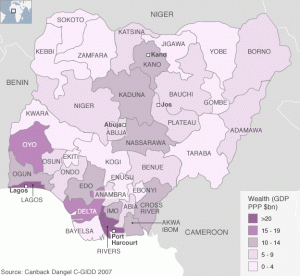by Conor Godfrey
Media producers and consumers alike tend to analyze current events using the framework provided by the most recent, similar set of events in the past.
How often did you hear the Arab spring compared to the democratization of Eastern Europe last year?
This is neither good nor bad, just somewhat confining.
I think this is happening with Boko Haram now.
Most western readers have probably heard something about these guys.
They are usually described as ‘Islamic jihadists that want to implement Shari’a law in Nigeria.”
We (middle class American readers like me) are used to these buzzwords – jihadist, Shari’a, terrorist- and they evoke a set of dependable associations.
Whether we are talking about people in Indonesia or Pakistan, Iran or Chechnya, these buzz words still conjure up images of Arabic speaking Middle Easterners that want to kill infidel Westerners for reasons that we cannot fully understand.
However, politics are always local.
Nowhere – not even in pork-laden West Virginia—is that more true than Nigeria.
Even the name, Boko Haram, is a local nick name in the local Hausa language (well, the word Boko anyway).
Perhaps the Boko Haram PR guy realized the media would refuse to cover them if they had to pronounce “The Group Committed to Propagating the Prophet’s Teachings and Jihad on the Air.”
While Boko Haram certainly pays homage to the worldwide phenomenon of political Islam, their roots are as local as hot pepper soup and Tuwo_masara.
The group takes historical roots in anti colonial anti missionary activity in the former Sultanate that covered the parts of Northern Nigeria where Boko Haram now operates.
In modern times, the group cut their teeth protesting endemic violence and corruption in the local government and security services.
These grievances became increasingly violent after the founder, Mohammed Yusuf, was tortured to death in police custody in 2002.
These same practices remain rife today! Read this very emotional blog regarding young, alleged Boko Haram militants in custody,
Boko Haram is also both a pawn and a player in a specifically Nigerian regional power dynamic.
The young men that killed themselves driving trucks filled with explosives into the U.N. compound in Abuja certainly had religion on their mind, but the people paying for the training, giving the organization political cover, or using the group as leverage with the Federal government may not be in it to guarantee their place in paradise.
Richard Dowden does a great job here discussing the morass of motives and incentives that could be driving Boko Haram’s activities.
Dowden also notes a tragicomic list of people and organizations that are using the Boko Haram brand for their own purposes—criminal syndicates: an arsonist churchgoer and northern Nigerian politicians are just some of the groups that have use the name of or affiliation with Boko Haram for purely local shenanigans.
Boko Haram itself might also be guilty of brand profiteering – with al-Qaeda.
While some members of Boko Haram certainly feel sympathy toward the pan-jihadist Qaeda platform, others probably see financial and logistical support.
As Boko Haram morphs into an umbrella for a number of different factions and interest groups, it will become increasingly difficult to negotiate a settlement that will stick.
My opinion is that Boko Haram’s main target is still the Nigerian government, and not the foreign crusaders and infidels identified in global jihadist rhetoric.
This means that solving the problem requires solving local triggers – not necessarily taking all of the militants off the field.
(Though that certainly helps if you can avoid making the local population hate you.)
In this case, the local trigger is the massive development gap between Southern and Northern Nigeria that fuels resentment, xenophobia, and radicalism. (see wealth map) 
It also means dealing with local flashpoints that feed the anger that in turn feeds Boko Haram – things like conflicts between settlers and so called indigenes, fair policing, and an education system that both moderate Islamists and the government can get behind.
If our mental filing cabinet wants to associate these guys with Middle Eastern jihadists, you can be darn sure that the average Nigerian would like to think of them as foreign too.
But I think societies need to claim the radicals at their margins no matter how unpleasant the thought might be.
These guys are Nigerian, and any global dynamics should be viewed through the local lens first.
First of all mohamed yusuf did not die in 2002, he died in 2009 after he started attacking police stations and killing policemen and christians. Secondly you just need to watch the statement of boko haram’s leader to hear him say they are terrorising civilians because they want sharia on the entire nation and they want the president to become a muslim. What kind of a brainwashed idiot are you anyway ? Do you have any consideration for the poor civilians being massacred by boko haram terrorists ? You are talk about the wealth gap: well Nigeria is a federation, just like the US, and every state fetches for itself, some do better than others, I don’t see it as a legitimate reason to start killing christians. But maybe what you want to say is that the killing of christians is a legitimate means of protest no matter how stupid your demands are.
HGH: First, thanks for catching the date. The group was formed in 2002, and the signature event of MY’s death was indeed in 2009…my wires crossed when I wrote it.
I think the rest of your critique confuses trying to understand BH, with sympathizing with their tactics. I am keenly interested in the former, and am appalled by the latter.
I hear the statements made by the remaining BH leaders in the field, and do think that they represent a genuine chord within the larger movement, but that does not mean that everyone overtly or covertly supporting BH has the same motives.
You could easily make a case that BH is a drag-and-drop Islamist movement from another battlefield. If that were true, the endgame would be killing or capturing a critical mass of their leaders and militants. However, I think that in this case, killing/capturing 90% of BH partisans would merely knock the movement into remission for a few years. The real causes are deeper, as discussed in the blog.
As you mention, the causes of violence are not important when choosing whether or not to condemn atrocities. They are important, however, when figuring out how to bring the conflict to a close.
I think the best solution is to kill or arrest the terrorists.
You have to terrorise the terrorists then you have to be security conscious for such things never to happen again.
In this case I would take the example of Israel.
You don’t dialogue with terrorists, you only crush them!
It is amazing that you would be thinking that we can’t kill terrorism, that the only way out is to bow down to terror.
It is so sad Americans who managed to defeat hitler and USSR (economically) have mentally been defeated by terrorism. You have to understand that that the only reason of terrorism is lust for blood, lust for killing for allah, the terrorists have to die and stop calling them militants (that makes no sense). And the solution you are proposing is ludicrous, the president can not make northern regions become richer than southern regions, it is the northerner who have to produce for themselves, that is what the southerners did. The northerners do not pay taxes because it is against islam, yet we share our taxpayers’ money with the north.
Are you suggesting we increased taxes in the south to suit the north ? Shall we starve southern christians to make muslims happy ?
The south produces oil , and the money is shared among all states. But the north produces absolutely nothing. I am sorry but you do not know enough about my country and your analysis is far from being accurate, it actually looks like a fiction.
What you are doing is denying acts of terror and finding excuses for it. You seem to be more sympathetic to terrorists than to a democratically elected government which sends 5000 troops on peace keeping annually. It seems to me that your aim in this article is to make your fellow Americans to see these terrorists as potential friends. You are denying the truth the same way America always denies the truth of a horrific act which is taking place (remember Rwanda, and the way the US media painted hitler in a good light before America was attacked.
You Americans are the worse friends Africans can have, because you pretend to be their friends while doing business with them but when terrorists threaten them, Americans can’t even give encouraging words: Call a spate a spate. Stop painting terrorists in a good light, just be honest.